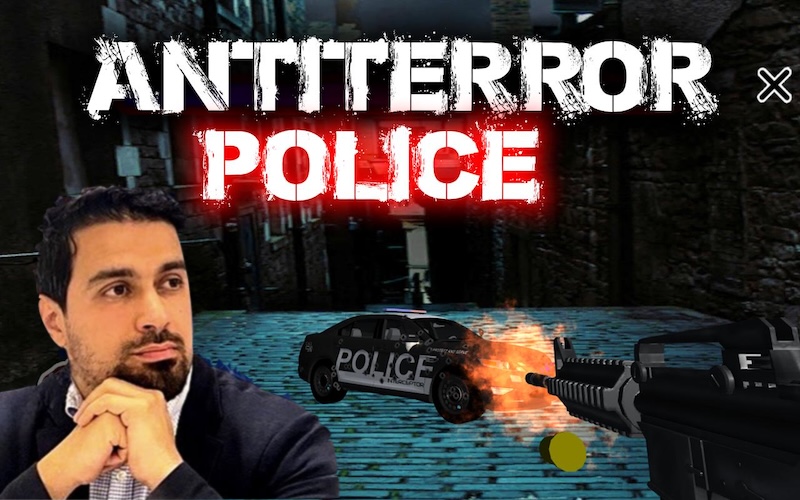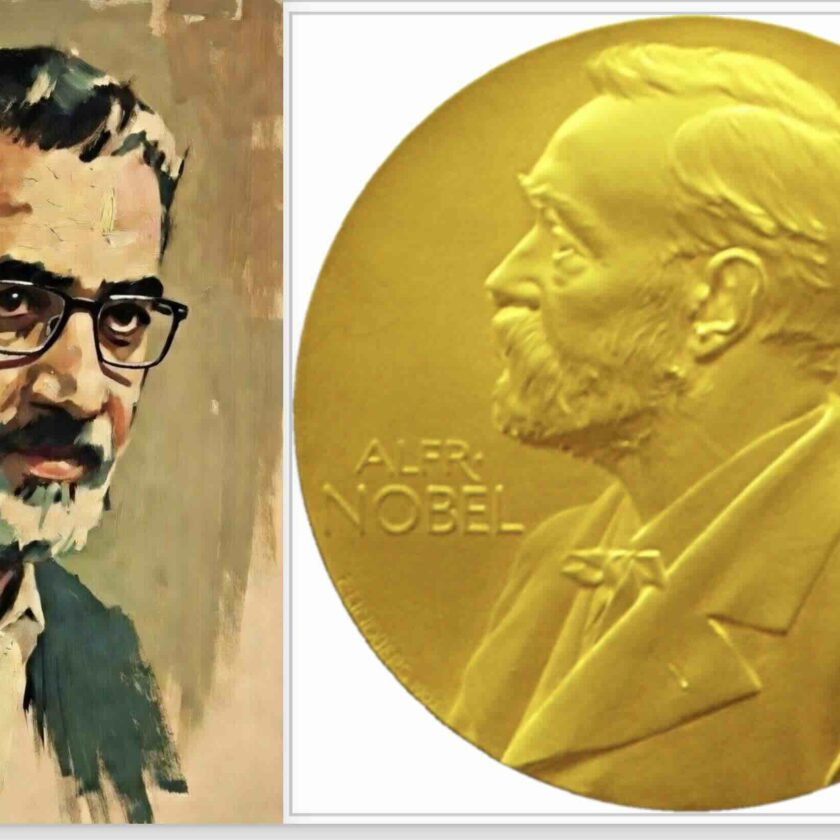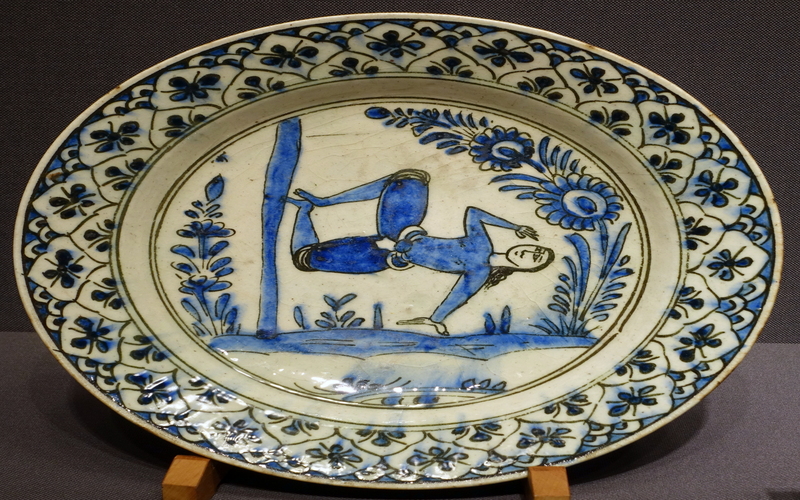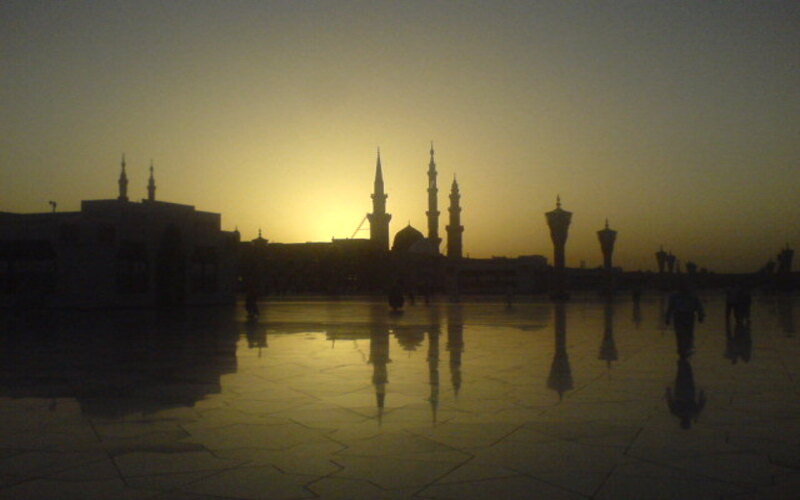Below is a translation of yesterday’s video from Youssef Hindi, who has been summoned for interrogation by so-called anti-terrorist police due to his research, writing, and broadcasts on geopolitics and the messianic-millenarian roots of the genocidal Greater Israel project. – Editor
Hello everyone and welcome to the 20th episode of Youssef Hindi’s Chronicles—and of course, welcome to democracy.
We’ll come back to this idea of French democracy.
First of all, as always, I invite you to support this channel more than ever via Tipeee and PayPal—links are in the video description.
Also, subscribe to Patreon. I’ve created a Patreon page and many of you have already signed up. Keep subscribing. I’ll be releasing a first video on Patreon exclusively for subscribers, in which I’ll answer your questions in early June, God willing, after my hearing.
With the anti-terrorism police—we’ll get to that.
So, head to the video description, subscribe to Patreon, and support this channel so I can continue publishing my chronicles on YouTube weekly via Tipeee and PayPal.
Now, let’s get to the heart of the matter.
Today’s topic isn’t really about me—you’ll see that I’m using my case to expand on a broader issue—but it’s still a serious situation that reflects the current drift of the French political system and regime.
To give you the main details:
I’ve been summoned by the anti-terrorism police—specifically, a unit known as GLAT, the Anti-Terrorism Task Force.
This group doesn’t deal with terrorism per se, but is an auxiliary unit of the anti-terrorism division. They handle cases like fake bomb threats, monitoring of radicalized individuals who’ve just left prison, and incitement or glorification of terrorism:
(video clip)
In the current context of war in the Middle East, antisemitic threats and glorifications of terrorism are on the rise. Yes, in France, since the Arras attack on October 13th, fake bomb alerts have also been increasing—in museums, train stations, airports. More than 60 investigations have been opened by the GLAT units—these are police units little known to the general public but highly valuable, according to William Molinier.
There are 210 specialized investigators spread across France. The GLAT units handle so-called “peripheral” cases—those related to terrorism but not officially classified as such. Their activity has surged in recent weeks. Normally, each group handled one or two cases a month. Since the Arras attack, the pace has jumped to one a day, according to a police source.
They mostly deal with glorification of terrorism, false bomb alerts, and administrative monitoring of radicalized ex-prisoners. They focus on “weak signals”—low-level threats—says one investigator. And it’s precisely this level of threat that’s being closely monitored now, because a seemingly mild case can escalate very quickly.
Once local investigators detect a sensitive file, it is then escalated to the anti-terrorism division of the judicial police or to the DGSI, this time under the official label of terrorism.
So, I’ve been summoned on June 3, 2025—likely in a case of glorification of terrorism involving someone else.
I am not the one being accused, since I’m being summoned as a witness.
According to Article 105 of the Code of Criminal Procedure, and I quote:
“Persons against whom there are serious and consistent indications of having participated in the acts under investigation by the examining magistrate may not be heard as witnesses.”
This means there is no evidence against me, no serious indications—I am indeed being summoned as a witness.
What must be understood is that for ten years I’ve been publishing books, and for ten years my books, articles, and videos have been scrutinized by law firms and by community organizations linked to the CRIF, etc.
So I know that for a decade now, efforts have been made to catch me out over a statement, to incriminate me—to trigger a search, custody, or even pre-trial detention.
They’ve been trying for years.
Let me remind you: I am a writer. I write books. I’m not even a political activist. I belong to no political party or political association. I’ve written 12 books, over a hundred articles. My work has been translated into half a dozen languages across four continents. I give lectures in France and abroad.
In ten years, I’ve never been taken to court—not once—for a video, article, or book.
So what does this summons mean? In my case, it means they haven’t found a way to attack or implicate me.
Otherwise, I would’ve already been taken into custody or placed in pre-trial detention.
They’re summoning me to interrogate me, likely with trick questions to get me to incriminate myself—to fall into a trap and say something that can be used against me.
At the end of the hearing, I could, in rare cases but it does happen, be placed in custody.
So that’s what this is about.
Now, what’s driving all this?
As I’ve already told you, since October 2023 there’s been a series of cases, convictions, searches, pre-trial detentions, custodial interrogations—targeting politicians, MPs or future MPs, like Rima Hassan, trade unionist Anasse Kazib, and others—possibly Mathilde Panot as well.
And in many of these cases, complaints or reports were filed by a group of 50 lawyers I’ve already mentioned—one of them is Olivier Pardo, who represents Benjamin Netanyahu in France. He also represents Azerbaijani president Ilham Aliyev and Éric Zemmour—a lawyer for very respectable, honorable people with no blood on their hands…
Also involved is Sarah Saldmann, a pro-Israel lawyer who organizes tax-deductible donations for the Israeli army.
These are people who support the Netanyahu government.
I remind you that Benjamin Netanyahu is the subject of an international arrest warrant for war crimes and crimes against humanity issued by the International Criminal Court.
Several rulings have also been issued by the International Court of Justice—not to “convict,” as it doesn’t work that way—but to order Israel to cease actions deemed genocidal.
I’ve already spoken about all this.
There’s a wave of repression and intimidation stemming from these pro-Israel complaints and reports filed with the French judiciary and police.
And so, the whole system gets moving—you see arrests, police custody, and so on.
So I’m probably being summoned as a witness in a similar case—one that, without a doubt, originates from those same pro-Israel lawyers.
And since, to this day, there’s been no statement or writing from me that’s punishable—and nothing that could qualify as glorification of terrorism—this is really about my work: historical research and analysis.
My aim is to explain—not to justify, but to explain.
Once I’ve laid things out, everyone is free to draw their own conclusions.
But clearly, my explanations are upsetting—especially because almost all of my sources are primary. When I write about a subject, I go straight to the source.
If I’m writing about Israel, I quote Israelis. If I write about the Muslim Brotherhood, I quote them or ex-members.
Small aside regarding current events:
To my knowledge, no French pro-Israel public figure who has openly justified war crimes or crimes against humanity committed by the State of Israel—or called for the ethnic cleansing of Palestinians—has been summoned by police or a judge.
It’s strange, this double standard.
We’re going to listen to some excerpts: there are public figures in France who call for the massacre and expulsion of Palestinians—who describe Palestinians as a “cancer.”
They say civilians in Gaza are as responsible as Hamas or Islamic Jihad fighters, and that they must pay dearly.
They support the Trump plan and say Gaza should be emptied—a blank slate. That Palestinians must go live elsewhere so an entire generation can mentally reset in a different environment—not next to Israelis or Jews, whom they supposedly seek to exterminate.
That time is over, they say. All hostages must be recovered, and then Gaza must be emptied.
These are people who support a state whose leaders, like Netanyahu, talk about a “people of light” and a “people of darkness.”
A state whose former Defense Minister Yoav Gallant said Palestinians are “human animals,” and that Israel would treat them as such—by cutting water, electricity, and food.
So we have people who support that government and work to ensure that those who criticize Israel find themselves imprisoned—or at least interrogated.
That’s where things stand in France today.
Now, let’s turn to the core issue.
Since we’re talking about terrorism and the glorification of terrorism, we need to examine definitions and legal categories.
Because we have to stop spreading nonsense on this subject.
So, I’m going to quote the Practical Dictionary of Humanitarian Lawpublished by Médecins Sans Frontières.
I quote:
“This term has no precise definition in international law. It remains loaded with political and ideological connotations. A person may be considered a terrorist by some and a freedom fighter by others. The United Nations, as well as the European Union, have for years attempted to reach a definition acceptable to all. However, to this day, no definition has reached consensus.”
Now, I’ll instead play excerpts from an interview with Johan Soufi, who is a lawyer specialized in international criminal justice and human rights. He has participated in various trials before international tribunals and United Nations bodies working on cases related to war crimes, crimes against humanity, and human rights violations. Since March 2023, he has been the legal and strategic advisor to the Prosecutor General of Ukraine. From 2020 to 2022, Johan Soufi was the head of the legal office of the United Nations Relief and Works Agency for Palestine Refugees, UNRWA, in Gaza.
So now I’ll play a first interview—an excerpt from an interview he gave to France Culture on October 13, 2023, at the very beginning of the war in Gaza. He is asked a question about terrorism, and listen to how he responds.
(video clip)
Yes, it’s a legal term, but above all a political term, a media term. From the standpoint of criminal law and a legal perspective, it is above all a term of national law. For example, in France, terrorism is defined in Article 421.1 of the Penal Code as the act of carrying out a certain category of actions with the aim of creating a sense of terror, notably among the population.
At the international level, there are also numerous conventions that regulate terrorism, but there is no universally accepted definition by the international community, and therefore no universally accepted legal definition of terrorism.
So, Johan Soufi explains to us that there is no universally accepted definition by the international community, and therefore by legal texts, of terrorism. There, we’ve heard it.
Now, I have a remark. If the definition is national, how is it that people in France are imprisoned, held in police custody, placed under formal investigation, or in pre-trial detention for comments they made about acts committed in another country? That’s a question I pose to legal experts. I’d like to understand how that works.
Regarding the definition of terrorism by the UN Security Council, Johan Soufi responds as follows on France Culture. Let’s listen to him.
(video clip)
In terms of the definition, indeed it is commonly accepted and, moreover, it broadly mirrors the French definition, which is essentially to create fear among the civilian population. The two stumbling blocks, in fact, with this definition—what poses a problem politically—are, first of all, state terrorism. Can a state, when it creates terror among the civilian population, be considered a terrorist state?
The second dimension is resistance and national liberation movements. Can, for instance, to break free from the yoke of colonization, some form of terror among the population—for example with the ANC’s techniques in South Africa—be permitted under international law?
And so the states are not all aligned on this, and you understand why in this context the Israeli-Palestinian conflict is at the center of the debate because it touches on both of these questions.
So, he speaks about the UN Security Council’s definition of terrorism, which is quite similar to the French one: “Creating fear among society.” He says this raises a problem. First, there’s the issue of state terrorism. Can we call a state terrorist if it practices state terrorism? Let me remind you that Robespierre, back in 1793, had already theorized—there are texts, notably cited by Xavier Moreau in his book Le Livre noir de la gauche française—texts about terror, about the political use of terror. I’ll close that parenthesis.
And then the other issue is the distinction between a resistance movement and a terrorist movement. He brings up the ANC, led by Nelson Mandela, who was once considered a terrorist and then went on to become president of a state, namely South Africa. Is that allowed under international law? That’s the question. Is armed struggle allowed under international law? Well, we’re going to answer that question. We’ll answer it by turning to UN resolutions on armed struggle.
So I’ll cite two resolutions for you. This is very structured—we’re not talking about speculation or interpretation.
The first UN resolution I’ll cite is 26/49 of November 30, 1970, on armed struggle, or rather on resistance. I’ll quote the first paragraph: this resolution states the legitimacy of the struggle carried out by peoples subjected to colonial and foreign domination and who have been recognized as having the right to self-determination, to recover this right by all means at their disposal.
End of quote.
So, the struggle is legitimized by the UN, and therefore by international law.
Then, a second resolution, more precise: UN Resolution 3070 of November 30, 1973:
“Also reaffirms the legitimacy of the struggle of peoples to free themselves from colonial and foreign domination and foreign control by all means at their disposal, including armed struggle.”
Then still the same resolution, 3070 of November 30, 1973:
“condemns all governments that do not recognize the right of peoples to self-determination and independence, particularly the peoples of Africa still under colonial domination and the Palestinian people.”
Therefore, the Palestinian people have the right, according to UN resolutions, to fight with arms against the occupier. There, it’s very clear. And so, saying this is in accordance with international law and cannot expose you to legal prosecution in France.
However, there’s the matter of war crimes. That’s another issue. War crimes are recognized under international law. It’s when a militia, an armed group, or a regular army commits crimes—like deliberately targeting civilians, for example—and there, when an organization, whatever it may be—Palestinian or otherwise—kills civilians, deliberately targets civilians, that’s a war crime. When Israel targets civilians, that’s a war crime.
Then there’s the question of proportion, of course. The scale of the massacres committed by the Israeli army is enormous compared to what Palestinian organizations have done.
If we’re talking numbers—I recently listened to an interview with Henry Laurens, a well-known historian whom I’ve cited several times, who is a professor at the Collège de France, and who says that the Israelis count Jewish deaths since 1870—that is, since the first Zionist Jewish settlements, not just Jewish communities, because Jewish communities already existed—the Old Yishuv in Palestine—but he’s talking about starting from the first colonies in the 1870s.
Israeli authorities have counted 30,000 deaths on the Israeli side, or more precisely, the Zionist side, because Israel was created in 1948, well after this count begins.
(video clip)
If you take the Israeli technical base, I don’t know why, they start counting Israeli casualties from 1860. I still don’t understand how they started from 1860. Personally, I would start from 1908. But that’s a historian’s detail.
In any case, they consider that their human losses since 1860, recorded, are 30,000 deaths on the Israeli side. Well—Jewish, Zionist, Israeli since 1860. That’s the most recent count he gave a few weeks ago; it was around 30,000.
Well, if we look at the Palestinian side… Before October 7, one might have thought the number of Palestinian victims—it’s a bit tricky to record because they are also caught up in inter-Arab conflicts that complicate things—we were looking at around 100,000.
So all of a sudden, we’ve jumped from 100,000 to at least 150,000.
On the Palestinian side, just from what happened in Gaza since October, we’re talking about more than 60,000 direct deaths, that is, directly killed.
And if we use estimates from The Lancet, which I’ve already referred to several times, so we count indirect deaths—that is, lack of access to water, those who died in the rubble, lack of access to medicine, to healthcare, etc.—we’re talking about over 240,000 deaths, in fact, today.
So, you see the proportions.
So it’s clear under international law: terrorism and armed struggle are two different things. But as we’ve said, terrorism is not clearly defined.
Well, now we’re going to talk about what’s happening today.
France has had shifting positions regarding Israel and terrorism. Remember the famous declaration by General de Gaulle on November 27, 1967, where he spoke about Israel colonizing, attacking, etc., and provoking a Palestinian response, a Palestinian resistance, which Israel in turn labeled terrorism. And in October 1967, there was a communiqué from the French embassy in Tel Aviv, which described Palestinian organizations, etc., as resistance movements.
So you can see it evolves depending on the states, depending on the regimes, depending on the times.
That’s why it’s very difficult to define terrorism, since each party’s position shifts with circumstances and historical periods.
But today, there’s been a reversal since the beginning of the massacre in Gaza, after October 7, among Western leaders, notably in France, on this question.
And here, I’m going to cite a very important communiqué, which has gone somewhat unnoticed, because you have to dig to find it. A communiqué from the French embassy—from the Quai d’Orsay—in London, a communiqué dated May 19, 2025, so just a few days ago.
Titled: “Israel, Palestinian Territory—Joint Declaration by the Leaders of France, the United Kingdom and Canada on the Situation in Gaza and the West Bank.”
Here are some excerpts I’m going to read to you. It’s very important, listen carefully because here we see a reversal.
“We strongly oppose the extension of Israeli military operations in Gaza. The level of human suffering in Gaza is intolerable. The announcement made yesterday by Israel to allow the entry of a minimal amount of food into the Gaza Strip is completely insufficient.
We demand that the Israeli government stop its military operations in Gaza and immediately allow humanitarian aid into the Gaza Strip. This must include a commitment with the United Nations to ensure the resumption of aid delivery in compliance with humanitarian law.
We call on Hamas to immediately release the last hostages it has cruelly held since October 7, 2023.”
The Israeli government’s refusal to provide essential humanitarian aid to the civilian population is unacceptable and risks violating international humanitarian law. We condemn the odious language recently used by members of the Israeli government and the threat of forced displacement of civilians faced with the desperate destruction of Gaza. Permanent forced displacement is a violation of international humanitarian law.
Israel suffered a horrific attack on October 7. We have always supported Israel’s right to defend Israelis against terrorism. But this escalation is completely disproportionate. We will not stand by while the Netanyahu government continues its scandalous actions.
If Israel does not end the new military offensive and lift its restrictions on humanitarian aid, we will take other concrete measures in response. We oppose any attempt to expand settlements in the West Bank. Israel must end illegal settlements that compromise the viability of a Palestinian state as well as the security of Israelis and Palestinians. We will not hesitate to take further measures, including targeted sanctions.”
“We are determined to recognize a Palestinian state as a contribution to achieving a two-state solution and are ready to work with others toward this goal.”
Regarding the evolving stance of the United States toward Israel, especially the Israeli government, the Trump administration is distancing itself for reasons I won’t revisit here as I’ve explained them in previous videos.
We see that the global geopolitical power balance is accelerating historically. Already, the legal proceedings initiated in France against critics of Israel are being overtaken by events. The convictions, summonses, and trials expected in the coming months will appear scandalous, as they will be seen as attacks by proxies of the Netanyahu government in France, notably through his lawyer Olivier Pardo.
So here we have a government being put on the international community’s blacklist. Netanyahu has even attacked France, Great Britain, and Canada following these official positions I just described, which highlight the extreme fragility of the Israeli government.
This is in addition to the international arrest warrant for war crimes and crimes against humanity targeting Netanyahu and his former Defense Minister, Yoav Galant.
Today, France finds itself doing the dirty work for the Israelis, for the Netanyahu government—that is, attacking those whom Netanyahu and his proxies consider political enemies on French soil for having criticized the Netanyahu government, supported Palestinians, or made statements that might fall under accusations of glorifying terrorism, even though sometimes those statements comply with international law, as I just cited.
(video clip)
For a long time, I was very reluctant to use this word—genocidal—because for reasons that would be too long to explain here, both legal and historical. But we have to face the truth: there are genocidal actors in the Israeli government. They proclaim it every day. Indeed, very violent statements like “we must eradicate,” “it’s not complicated,” “we want to kill everyone,” “we want to destroy everything”—these are genocidal statements. The army is committing acts that are, at a minimum, massive war crimes and crimes against humanity.
That’s all for today. I remind you that I am summoned by the anti-terrorist police, the GLAT (the anti-terrorist fighting group), as a witness. Nothing is being reproached to me, but they will certainly try to trap me and move me from witness to accused.
That’s where we stand today.
So I strongly encourage you to support this channel via Tipeee and PayPal in the video description and to subscribe to my Patreon, where I will post at least one video per month responding to questions from Patreon subscribers.
So, I say to you, God willing, see you next Wednesday, knowing that my hearing is on Tuesday, June 3. If all goes well, I will make my Wednesday video; otherwise, if you don’t hear from me on June 4, it means I am in police custody.
Thank you very much, see you soon, and have no fear—trust in God. See you soon!






